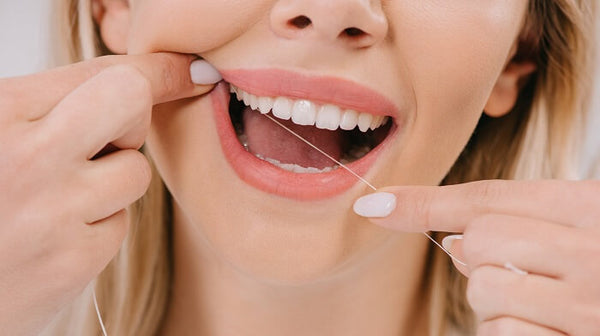Taking good care of our teeth and gums is crucial for avoiding cavities and keeping our smiles bright. Bleeding gums when flossing is a typical problem that many people worry about. Questions and concerns about bleeding gums while flossing, including how long it takes for bleeding to cease, what causes bleeding gums, and how to stop bleeding during flossing, are the focus of this article. Let's dig in and learn about the best treatments and preventative methods for maintaining good dental health.
How Long Does it Take for Gums to Stop Bleeding When Flossing?
When people first start flossing, they often question how long it would take for their gums to stop bleeding. The length of time it takes for your gums to recover might vary depending on the severity of your gum disease, how well you take care of your teeth, and how healthy your mouth is in general. In most cases, it might take anywhere from a few days to a couple of weeks of regular, proper flossing for the gums to cease bleeding.
How to Stop Gums from Bleeding When Flossing?
Don't freak out if you see any blood when flossing. Fortunately, there are a number of practical solutions that can be put into place to improve people's dental health. If you get bleeding gums during flossing, try the following:
1. Improve Flossing Technique
- Hold the floss firmly but gently between your fingers.
- Slide the floss between your teeth using a gentle back-and-forth motion.
- Avoid snapping the floss into your gums, as it can cause irritation and bleeding.
- Curve the floss around each tooth, reaching beneath the gum line to remove plaque and debris.
2. Use Softer Floss or an Alternative
- If you find traditional floss too harsh on your gums, consider switching to a softer floss or floss picks.
- Water flossers or oral irrigators can also be an effective alternative for individuals with sensitive gums.
3. Incorporate Regular Dental Check-Ups
- Schedule regular dental check-ups and cleanings to identify and address any underlying oral health issues.
- Your dentist can provide professional guidance on proper flossing techniques and recommend suitable oral care products.
4. Eat a Variety of Healthy Foods
- To keep your gums healthy, it's important to eat a balanced diet high in vitamins and minerals.
- Gum health may be improved and bleeding stopped by eating foods rich in vitamin C, such as citrus fruits and green leafy vegetables.
5. Avoid using Tobacco Products and Drinking to Excess
- Tobacco usage and heavy alcohol intake both raise the risk of gum disease and bleeding.
- To improve your dental health as a whole, you should avoid tobacco products and drink only in moderation.
6. Try a Rinse with Mouthwash
- Plaque and gum irritation may be mitigated with the use of an antimicrobial mouthwash.
- If you want advice on which mouthwash is best for you, see your dentist.
Bleeding Gums When Flossing: Common Causes

Understanding the common causes of bleeding gums when flossing can provide insight into effective remedies and preventive measures. Here are some of the leading causes:
1. Gingivitis
- Gingivitis is an early stage of gum disease characterized by gum inflammation and bleeding.
- Inadequate oral hygiene, such as infrequent or improper brushing and flossing, can contribute to gingivitis.
2. Periodontal Disease
- If left untreated, gingivitis can progress to periodontal disease, a more severe condition affecting the tissues and bones supporting the teeth.
- Periodontal disease can cause persistent bleeding gums, bad breath, and even tooth loss.
3. Medications
- Certain medications, such as blood thinners, can increase the likelihood of gum bleeding.
- If you're taking medications and experiencing frequent gum bleeding, consult your healthcare provider for further guidance.
4. Hormonal Changes
- Hormonal fluctuations during pregnancy or menopause can make gums more susceptible to bleeding.
- Maintaining good oral hygiene practices during these periods is crucial.
FAQs
Why do my gums bleed when I floss?
Bleeding gums when flossing can be caused by factors such as gum disease, aggressive flossing, medication side effects, or hormonal changes.
Is it normal for gums to bleed when flossing?
Occasional minor bleeding during flossing is relatively common, especially if you've recently started flossing or have gum inflammation. However, persistent or excessive bleeding should be addressed by a dental professional.
How can I prevent gums from bleeding when flossing?
To prevent gums from bleeding when flossing, improve your flossing technique, use a softer floss or floss alternative, follow a balanced diet, and maintain regular dental check-ups.

